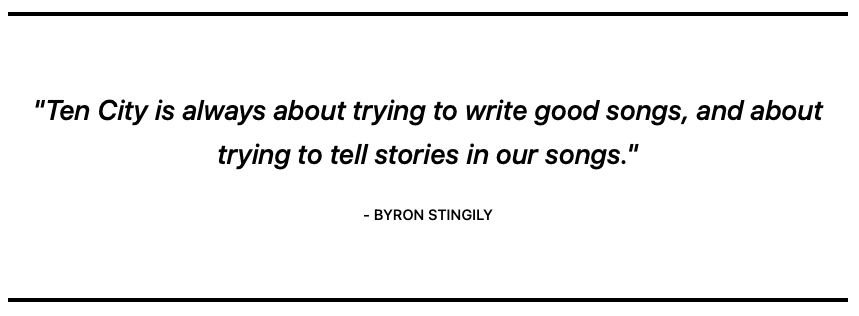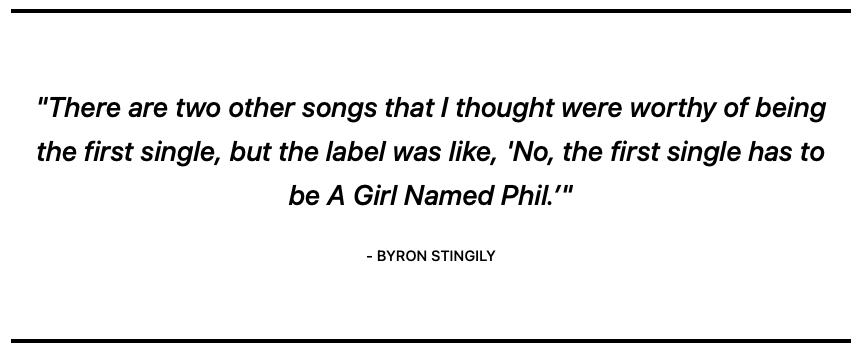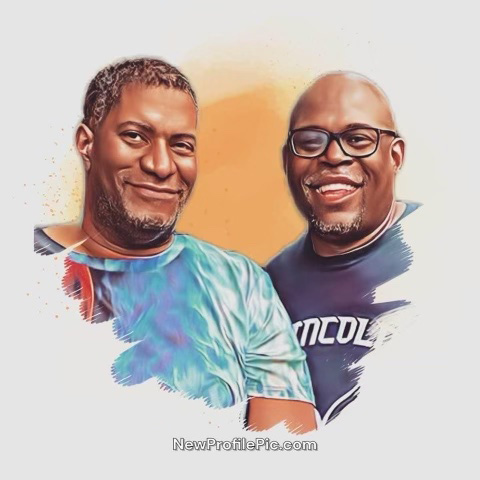Ten City’s Byron Stingily and Marshall Jefferson Drop New Single, A Girl Named Phil
Written by Jon-Michael Foshee

Fresh off their Grammy Nominated album, Judgement, Byron Stingily and Marshall Jefferson are back in the studio recording songs for a brand new Ten City album.
Devotion. That’s The Way Love Is. Right Back To You. My Peace of Heaven. Be Free.
Ten City has been responsible for creating the music that moves us. Their stories, their sound are the soundtrack of our dreams, our loves, our lives. The music of Ten City lives on in our collective memories, in our heart, and the beat of that heart is Byron Stingily and Marshall Jefferson.
Together, they have inspired us over the course of four decades, and if the power of their new songs is any indication, they are just getting warmed up.
“I’ve written love songs since I was a kid,” Byron Stingily says. “Most of my songs have been about love and relationships. So, sitting down to do this album, I wanted to say things that I hadn’t said before and talk about subject matters that were refreshing, new.
“Our first big, big, big record that hit the Top Ten Pop Chart in Europe was That’s The Way Love Is; it’s about breakups, getting over it, and love happens, things happen. For A Girl Named Phil, I was like, ‘What can I do or say that hasn’t been said before?’”

“I did not want Phil to be one thing,” Byron Stingily says. “I wrote the song in a way that it could mean many things to many different people.
“There was a Prince song years ago called, Bambi, where he was talking about a girl he liked but who didn’t like him. And then there was a Barbara Mason song, Another Man. I wondered how that can be said in a refreshing way, but in a way that is not demeaning or anything like that.
“Believe it or not, there are so many different things that happen in relationships that aren’t the same as the way they were thirty years ago. Things that are accepted in terms of relationships are very different from even ten years ago. So, I thought about a song that could mean a lot of different things.”


“Ten City is me and Marshall Jefferson right now,” Byron Stingily says, “and we have other musicians and producers we work with. One producer who is prevalent on the album is Emmaculate, who was on my single, Be Free, and the song, Judgement, on the last [Ten City] album. A Girl Named Phil was produced by myself, Marshall, Emmaculate, and Shebazz Curtis.
“I recently signed a new deal with Patrick Moxey’s new label, Helix Records, which is distributed through Warner (Warner Music Group), and to still be doing music on a major label, to be nominated for a Grammy last year, to have all of these things happen this far along in my career—you know, a lot of people are around for maybe one or two years and that’s it—so to still be around and still doing music after all this time, I’m appreciative of it.”
Marshall Jefferson and Byron Stingily recently reunited in 2021 to release Ten City’s first new album in 27 years. That album, Judgement, earned Ten City a 2022 Grammy Nomination for Best Dance/Electronic Music Album.
Black Coffee would go on to win the Grammy in their category for his 2021 LP, Subconsciously, but that spark from what Byron and Marshall created on Judgement ignited new waves of inspiration and ambitions for their collaboration. Ten City was back.

“We didn’t win [the Grammy Award], and it was like motivation. We said, ‘Let’s get back in,’” Byron Stingily says.
“Marshall and I came back home [from the 2022 Grammy Awards] and hit the ground running. There’s no pressure, but we went in with the mindset of, ‘Let’s get in and try to make an even better album, and hopefully we can make it back,’ or ‘Hopefully we can even win this time around.’ The mindset was: let’s get started writing.
“The record label decided they wanted A Girl Named Phil to be the first single, and they almost decided that immediately when they heard it. I was very, very surprised. I thought they wouldn’t get it, that they wouldn’t get the content, and it was a very rough form.
“The vocals are the vocals that wound up on the record, but the original demo was just the song. The string line was played on a keyboard, and it was just the keyboard string line, a piano, and it had some rough reference drums, and they were like, ‘This has the potential to be a smash.’
“It was very rough, to the point where one of my kids heard it when I was working on it and said, ‘That sounds dated.’ I said, ‘Of course it does, it’s just a reference, it’s just an idea. Once I put all the live instrumentation, horns, the bass, the guitar, and put some up-to-date drums on it, it’s going to take on a whole other life.'”
“The record company, to their credit, they saw that even though it was not produced it had the potential to be a hit song. They said, ‘This is a great song, it tells a story,’” Byron Stingily says.
“And that’s what Ten City has always been about.“

“A lot of people like things about the production; Emmaculate did an excellent production. I co-produced it, but he sat in the driver’s seat. Me and Shebazz Curtis sat in the kind of co-pilot seats. Ten City is always about trying to write good songs, and about trying to tell stories in our songs.”
The most powerful songs are the ones that move us emotionally. Music has the ability to lift our spirits, to make us cry, to make us sing out for joy (even if we can’t sing well), to drive our workouts, to strengthen our love, and to revive long-lost memories with sudden clarity.
Ten City recognizes the power of music and story in ways that inspire and move us. In their music we see ourselves, our lives, our journeys, our dreams, our struggles, and, most importantly, our hopes.

“Being a nominated artist at the Grammys was one of the best experiences of my life,” Byron Stingily says.
“And what’s so funny is I wasn’t even going to go. I didn’t even want to go. I’m not a person who likes to be around celebrities and famous people and be in the lights. At heart, I’m very introverted. I don’t even like to be around crowds, especially with COVID going on. I didn’t want to go; I’m not even really into celebrations.
“Even when I graduated college, I didn’t decide to go until the day before graduation, but I decided to go because my mom really wanted to see me walk across the stage. I didn’t even put in my order for tickets, but they made an exception for me and let us come.
“So, I’ve just never really been into celebrations for whatever reason, but it became a thing. Everyone I talked to was like, ‘Hey, you got nominated for a Grammy, that’s big.’ People were asking, ‘What’re you going to wear?’ I was saying, ‘I’m not even sure I’m going,’ and they were like, ‘You’re crazy, how many people would quote-unquote “kill for this opportunity?” ’ or ‘What an honor it is to be nominated, this is something you’ve worked for your whole career!’
“My superintendent said, ‘I’m so looking forward to you going to the Grammys,’ and I said, ‘I’m not sure if I’m going to go.’ He was a big reason I went. He said, ‘No, you have to go.’
“Another big reason was my wife. She was kind of asking me if I was going, and she really wanted to go. She wanted to experience it, to walk down the red carpet, and so for her, just getting dressed up in her gown, she felt like a Queen or a Princess.
“It was a very proud moment for me.“

“My cousin really wanted to go, and he went. For them to have that experience, it meant more to me to see my wife and my cousin happy, to see my wife’s face lit up and how happy she was, to see my cousin’s face.
“We sat by Tiffany Haddish, and right in front of me was Daymond John, the guy from Shark Tank who owns FUBU. It was funny, one of my friends from Chicago who works with him closely as his top aide was sitting next to him. He turned around and was excited to see me there.
“To see Aleta Adams and Shaggy—I’m just talking about the people sitting in our proximity—to be right there with Lizzo, H.E.R., Nas X, BTS, Justin Bieber, we were right by all these acts.
“I got to see Grandmaster Flash; we’ve been friends for years, and to see him get a Lifetime Achievement Award, to be there in that moment, to watch all those great performances, it was really something. It was like witnessing one of the best concerts I’ve ever seen in my life. All the performances, Billie Eilish, all these new Pop acts, just to see them right up close was great.
“And to be nominated. We didn’t win, but there were only six people or groups nominated for Best Dance/Electronic Album, and there are almost five thousand dance records released every week. And it wasn’t like that when I first started out. So, out of all of those songs and records to come out, to be one of the six to be nominated, I felt like we already won.
“I actually felt no disappointment when they called out Black Coffee. We were on the same label, Ultra, and Black Coffee just produced Break Stuff on Drake’s album.“

“Black Coffee came out to my show in South Africa a few years ago and told me I was an influence for his music, and so to see him win, if it was going to be anybody, I was glad it was Black Coffee.”
“I was just happy to be nominated; I didn’t feel disappointed, but I did feel like I definitely want to get back and I definitely want an opportunity to win,” Byron Stingily says.
“It might be tougher this time around because you have Beyonce and Drake all doing House records. People are going to recognize those names, so it might be tougher, but at the same time, I want to get back. It’s definitely a motivating goal in doing this album because now we want to make an even better album, and I feel we can top our last album.”

Ten City is no stranger to chart-topping success. Their 1988 hit, That’s The Way Love Is, debuted at No. 1 on the US Dance Chart, No. 12 on the US R&B Chart, and at No. 8 on the UK Singles Chart.
Ten City would continue to climb charts across the world with hits like Devotion, Where Do We Go?, Whatever Makes You Happy, My Peace of Heaven, Right Back To You, Fantasy, and more. They have recorded music for some of the top labels of the era: Atlantic Records, EastWest Records America, Columbia Records, and, most recently, for Ultra Records, a subsidiary of Sony Music Entertainment, for their Grammy Nominated album, Judgement.
“After [Judgement], we had an opportunity to put the new album out on Patrick Moxey’s new label with Warner, Helix Records,” Byron Stingily says. “It was very exciting because he was the one who signed us to Ultra Records. We wanted to keep the same synergy and the same team around us, so we stayed with Patrick Moxey.
“What people don’t understand is we hadn’t done an album in twenty-seven years. Patrick reached out for us to do the last album; he contacted me and was like, ‘Hey, I want to do a Ten City album.’ He only had two stipulations for Judgement: he wanted us to do a remake of That’s The Way Love Is and a remake of Devotion. He gave us creative freedom with the other songs on the album.
“[Patrick Moxey] said, ‘I want you to go in and just do you. I want it to be an authentic Ten City album, so just go in, have fun, and do what it is you do,’” Byron Stingily says.

“Just the whole thing of someone saying they believe in you enough and saying things like I had always been one of his favorite song writers, not just in dance music, but period. That was just refreshing, because so many times in the music business you get people trying to change you.”
“I’ve had other labels approach me about doing projects, and it was always like, ‘Well, if you do it, you’re going to have to work with this person, you’re going to have to work with this producer.’ If I have to do all of that with this person and that producer, it would not be my project. It would not be my vision.
“So, I wanted to remain with Patrick because of the belief he showed,” Byron Stingily says. “I might be loyal to a fault sometimes, so to speak, but he shares the same vision for the group that we share.
“At the end of the day, he’s investing money in us, and I would love to see his investment pay off, but I can tell you it’s not just about money. It seems like our project is a project that he is genuinely passionate about, and he loves the music. That means a lot.”

“There are two other songs that I thought were worthy of being the first single, but the label was like, ‘No, the first single has to be A Girl Named Phil,’” Byron Stingily says.
“The record label usually makes that recommendation [on which songs become singles]. Sometimes, if you have a manager who has a proven track record of being able to pick hits, the manager can advocate for what the group would like to see as the first single, or sometimes the group may push it.
“Typically, the record label has an A&R team (Artists and Repertoire) who sit in and listen to the songs presented. We had turned in five songs to the label, and when they heard the first five songs that were finished, they said, ‘We’re putting out A Girl Named Phil, and we’re putting it out the last week of July.’
“Then they said, ‘We’ll put out another single sometime in September, and then we’ll look to put a third single out, then the album right after the new year,'” Byron Stingily says.
“We’ll know after the first weekend how the song is buzzing. It’s difficult now with digital, streaming. Used to, you could say, ‘We sold 100,000 records this weekend’ or whatever. You just knew.”
Streaming has delivered unrivaled powers to the fans, but, for artists, tracking their music’s performance and how they are getting paid can be frustrating.
Certain key metrics on platforms like Spotify, Apple Music, and YouTube can determine an artist’s ranking and how much they can earn, unlike the raw record sales figures of the past. Metrics like Total Streams, Total Plays, Play Time, Saves, Followers/Subscribers, Playlist Adds, Song Purchases, and Album Purchases all contribute to chart rankings and overall revenue.
For record labels, certain categories such as Total Streams/Plays, Unique Listeners, Followers/ Subscribers, Play Time, Song Purchases, Album Purchases, Audience Retention, and Demographics can determine if an artist stays on the label.
In short, the numbers hold the key to an album’s success, and the ways those numbers are measured are getting more and more complicated. So, the question for creators becomes: ‘How does an artist navigate the modern day music industry and still write/produce/perform great music without metrics negatively affecting their career?’
For Byron, the solution comes from the same passion he has for creating music in the first place.
“Throughout my career, I’ve tried to kind of disassociate myself [from the numbers],” Byron Stingily says. “What I mean by that is, ‘I create it, it’s done, what’s next?’ in terms of moving on to the next project. I think while I’m creating, I’m not thinking about a hit song, or worrying about ‘Is it a hit or not?’ while I’m doing it.
“I think if you worry about it while you’re doing it, it’s not really a good frame of mind to be in. I think when you’re creating, you just need to be going in and having fun and creating something that you think feels good.
“If you go in, like, ‘Oh, it’s got this element to be a hit,’ it kind of convolutes it.”

“I worked one time with Lamont Dozier, who wrote a lot of Motown hits and was a part of Dozier Holland,” Byron Stingily says. “I had an opportunity to write with him, and he kept saying, ‘Can you come up with a better word? Can you come up with a better way to tell the story? Tell it like it’s a movie, and you only have three minutes to tell it in a song. You got to make sure that they can visualize it.’”
This interview was conducted one week prior to the news of the sudden death of prolific singer, songwriter, and producing giant, Lamont Dozier. Through collaborations with brothers Brian and Eddie Holland, they would write such timeless hits as Heat Wave and Jimmy Mack with Martha and the Vandellas, Bernadette and I Can’t Help Myself with the Four Tops, and You Can’t Hurry Love and Baby Love with the Supremes, just to name a few.
According to the detailed New York Times article celebrating Mr. Dozier’s life and his legacies, “Between 1963 and 1972, the Holland-Dozier-Holland team was responsible for more than 80 singles that hit the Top 40 of the pop or R&B charts, including 15 songs that reached No. 1.”
“He was very, very into detail,” Byron Stingily says. “Sometimes some of the best songs you write happen in three or four minutes—you just write and that first idea you have is good. He was always like, ‘Tell the story, and people have to feel it and see it, either a story that people have been through themselves or that they can envision.’ That always just stuck with me,” Byron Stingily says.
“When I did my first album, I was living in my mom and grandma’s basement. I was a college kid, and I was just happy to be in a studio; I was like, “Man, this is fun!” Now, when I do music, I have a day job—I’m a school principal—so, when I go into the studio, I look at it like, ‘I’m going in and I’m creating music.’
“I’m just so happy to still be able to do music.”
We’re happy, too, Byron. As long as you and Marshall have something to say, we’ll be lining up to listen.

Ten City’s new album will debut in early 2023, but you can download their first single, A Girl Named Phil, Right Here, Right Now.
For more helpful resources and information for your needs and to enrich your daily lives, gather together on the Chicago Devotion Home Page and follow us on Facebook and Twitter, @ChicagoDevotion.

